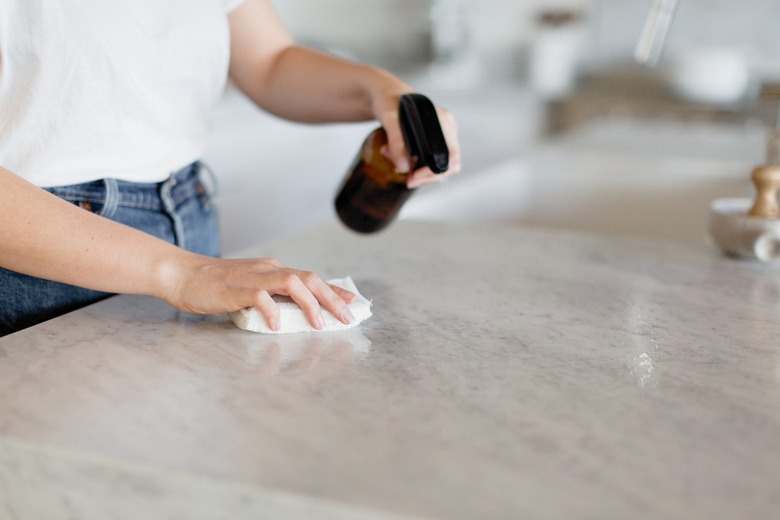How To Get Rid Of Ants Without Harming Pets
We may receive a commission on purchases made from links.
Even if you manage to keep your home eat-off-the-floor clean, you will occasionally uncover a trail of ants somewhere in the house. Often, the knee-jerk reaction is to reach for the bug spray — but wait. If you share your home with pets, there is more to consider than just zapping the bugs you see.
When pets are involved, the mantra should be "kills ants safe for pets." Fortunately, there are pet-friendly ant killers you can buy; home remedies for ants that you can whip up yourself; and if the situation becomes dire, professionals you can call to eliminate the ant problem without harming your pets.
Know Your Enemy
Know Your Enemy
There are over 700 types of ants in the United States alone, and some of the most common types include carpenter ants, black ants, odorous house ants, and fire ants. Knowing the difference among ant species can help you pick an effective ant killer that is safe for pets.
Most ant species that invade your home are looking for food and water. They like to eat some of the same stuff that we humans do, including sweets and meat. In cold northern climates, ants are most active in the spring and summer, but in warm climates, ants can be a problem year-round.
Ants live in colonies with members that can number into the thousands. The ants you see crawling on your counter are workers, also known as foragers. Their job is to collect nourishment for the rest of the colony in the nest, consisting of a queen and the larvae and pupae that come from the eggs the queen lays.
Because the workers bring food back to the nest, the best way to wipe out a colony is to trick the workers into carrying an insecticide back to the queen and her brood.
Ant Killers and Pets
Ant Killers and Pets
In most cases, the insecticide doses used to control ants are so small that most pets are not affected by them. "Most of the time, there is no concern if the homeowner has followed the instructions the pest control company has left, meaning they have kept the pet out of the environment for several hours until the insecticide has had a chance to dry," says Renee Schmid, DVM, DABT, DABVT, and manager of veterinary medicine and professional services for the Pet Poison Helpline.
The same goes for homeowner-applied remedies, like ant bait stations. "Just keep them out of reach of the pet," says Schmid.
Of course, there are some exceptions to the rule. Granules that kill fire ants often contain bifenthrin, a chemical to which dogs are sensitive. Fire ant treatments containing bifenthrin are usually used outdoors, but if a dog gets into these, they can cause neurological symptoms, like difficulty walking, body tremors, and even seizures, according to Schmid.
Pyrethrins/pyrethroids are a class of insecticides that are safe for dogs, except for bifenthrin, which is part of the group. However, cats and fish are very sensitive to the products. It's so toxic to fish that Schmid recommends covering or removing the aquarium when a product containing a pyrethrin or pyrethroid is applied.
Signs of trouble to look for in cats include vomiting, twitching, seizures, and difficulty breathing, among others. Seek veterinary attention immediately, as pyrethrins/pyrethroid poisoning in cats can be fatal.
Tip
If you think your pet has been exposed to a potentially dangerous insecticide, call your local veterinarian or contact the Pet Poison Helpline, a 24/7 animal poison control center, at 855-764-7661.
Home Remedies for Ant Problems
Home Remedies for Ant Problems
One common home remedy for ants is to spread diatomaceous earth where you see ants. Diatomaceous earth is the fossilized remains of diatoms, which are small sea animals, and these are safe around pets, though they shouldn't inhale or eat the dust. As the ants walk through the diatomaceous dust, it attaches to the body of the ants and dehydrates them. Use food-grade diatomaceous earth, as the other type is used in swimming pool filters and contains additives that are harmful to pets.
The problem with diatomaceous earth is that it only affects the ants that actually touch it. Very little is carried back to the colony. The same is true of spraying ants with a mixture of dishwashing soap and water. The solution will suffocate the ants but only those you hit directly.
Commercial Ant Killers
Commercial Ant Killers
There are many spray products available that advertise being safe to use around children and pets. Most are plant-based, or they contain essential oils to kill ants on contact. To keep pets safe, be sure to carefully follow the directions on the label.
"If you are using a product you've never used before and are uncertain about it, check with your veterinarian," advises Schmid.
How to Repel Ants
How to Repel Ants
You may be able to get ants to leave your home by using an ant repellent. Many commercial sprays are designed to keep ants away. If you use them or an exterminator applies them, make sure your pets do not enter the area until they are dry.
As an alternative to a commercial ant repellent product, you can make your own pet-safe repellent that can disrupt the normal activity of worker ants. When ants leave the colony, they leave a trail of chemical scents called pheromones. When they find a food source, they return to the colony, leaving a pheromone trail for other ants to follow. You may be able to disrupt the routine by spraying the trail with something that confuses the workers.
Vinegar is a good disrupter because ants hate it. Mix white vinegar and water in equal parts in a spray bottle and use it on ant trails and around areas where ants enter your home. You can try the same technique using lemon juice.
Warning
Mint is a natural product that deters ants (mix 20 drops of peppermint essential oil with two cups of water and spray it around baseboards and windows), but it's not safe for pets. Keep peppermint oil out of reach of pets if you do use it to repel ants. Cats, especially, can get very sick from ingesting peppermint oil.
When to Call a Professional
When to Call a Professional
Small infestations can often be handled by the homeowner, but if you have tried a number of things and there is still a problem, it is time to call in a pro. It is also a good idea to call a pest professional if you have carpenter ants, which destroy wood by burrowing into it to build their nests, or fire ants, which can sting.
Exterminators should be licensed by the state. Make sure whomever you hire knows you have pets in the house.
"Ideally, you should get the pets out of the house during the application," says Schmid. "Take them to a friend's house or a day boarding facility. Keep them out as long as is recommended. Keep them from licking or ingesting any insecticide that is still wet."
Sometimes, the problem can be handled in one visit. The pest company will spray around the perimeter of the house and may leave bait stations where ants are most active. Some infestations require follow-up visits.
Keeping Ants Away
Keeping Ants Away
Ants take up residence in your home because they are looking for food, water, and shelter. Keeping the house as clean as possible can help, although it is difficult to maintain the level of cleanliness required on an ongoing basis.
Combine that with sealing up the ways that ants enter the house. These include cracks in the foundation as well as cracks around windows and doors and the small spaces where pipes and electrical conduit enter the home. Also seal around plumbing under kitchen and bathroom sinks. Use caulk or expanding foam that comes in a can to seal these areas.
You can also use strong-smelling items, like vinegar and lemon juice, to discourage ants from entering. Some people use coffee grounds or cinnamon to discourage ants.
Reinforce your efforts by creating a 3-foot buffer between the landscaping and the walls of your house. Ants like using vegetation as a bridge into your home.


